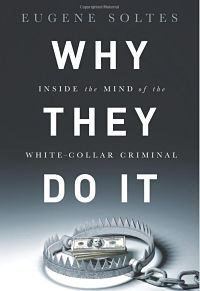Why they do it: Inside the mind of the white-collar criminal. (2016)

“…knowing the difference between right and wrong is not sufficient to avoid falling into the behavioral traps people can face when under pressure to succeed.”
Eugene Soltes, Harvard Business School professor
Pub: PublicAffairs
From the publisher’s blurb:
Soltes spent seven years (talking to) the men behind the largest corporate crimes in history – from the financial fraudsters of Enron, to the embezzlers at Tyco, to the Ponzi schemers Bernie Madoff and Allen Stanford.
White-collar criminals, he shows, are not merely driven by excessive greed or hubris, nor do they usually carefully calculate the costs and benefits before breaking the law and see it’s worth the risk. Instead, most of these executives make decisions the way we all do – on the basis of their intuitions and gut feelings. The trouble is, these gut feelings are often poorly suited for the modern business world.
From an article featuring audio of Soltes’ interview with Bernie Madoff:
… Eugene Soltes asked Madoff: How would you explain your actions and misconduct to students? The recorded answer offers sobering lessons for anyone with business ambitions.
“… when I look back, it wasn’t as if I couldn’t have said no. It wasn’t like I was being blackmailed into doing something, or that I was afraid of getting caught doing it. I sort of rationalized that what I was doing was OK, that it wasn’t going to hurt anybody.”
The recording shows … that knowing the difference between right and wrong is not sufficient to avoid falling into the behavioral traps people can face when under pressure to succeed.
… (in the interviews) Madoff exhibits several all-too-familiar cognitive biases, psychological tendencies that can lead to irrational behavior…
- Ambition
- Overconfidence
- The ‘slippery slope’
- Lack of self-control
- Rationalization of ‘iffy’ decisions.
Purchase the book here: Why they do it
Read Carmen Noble’s article here: Bernie Madoff explains himself
24 October 2016, Harvard Business School Working Knowledge






Leave a comment
Back to the top